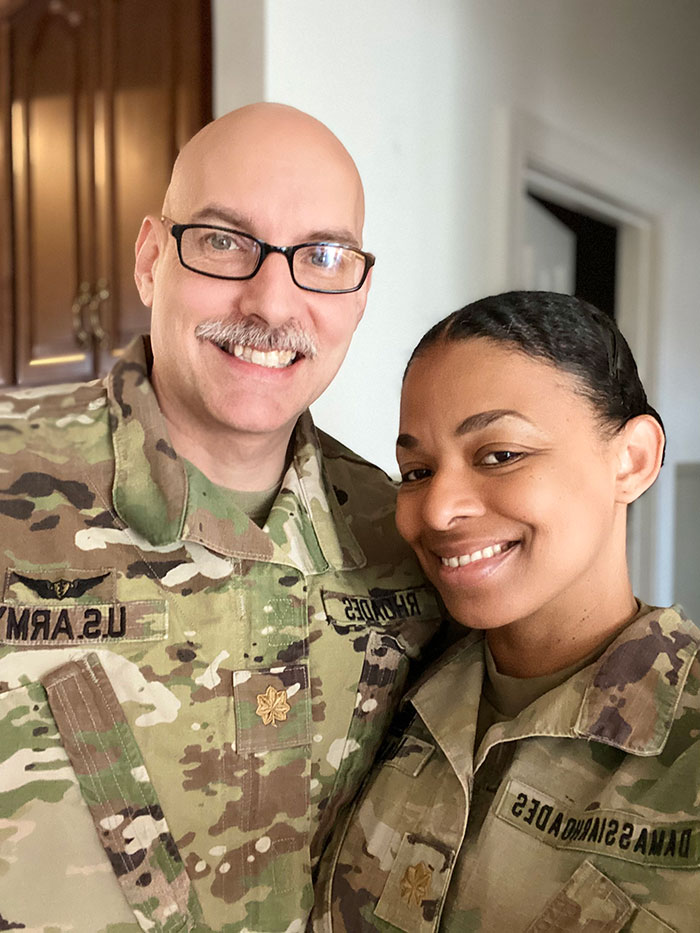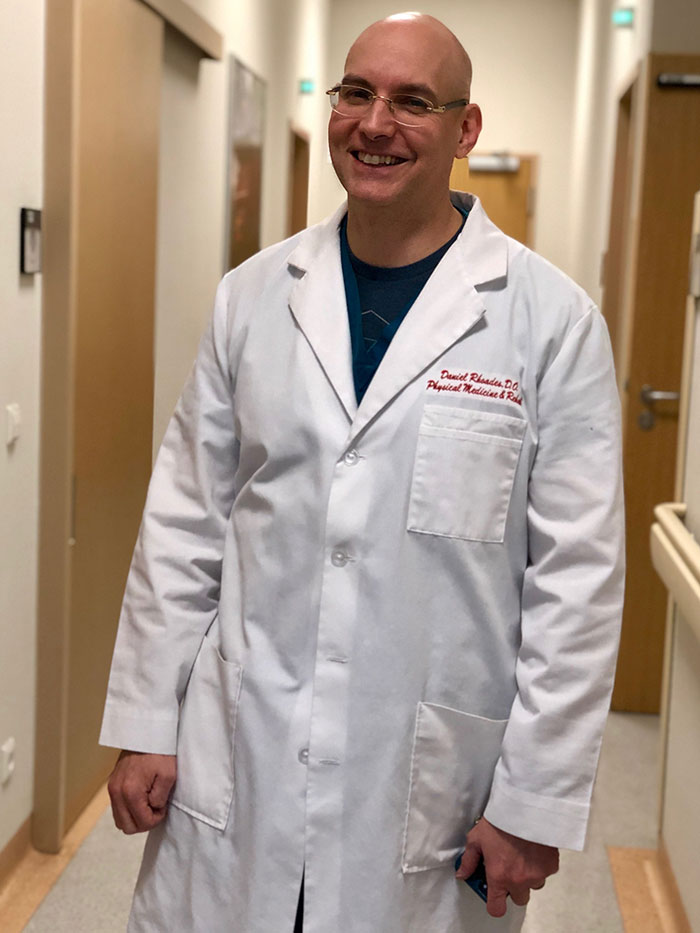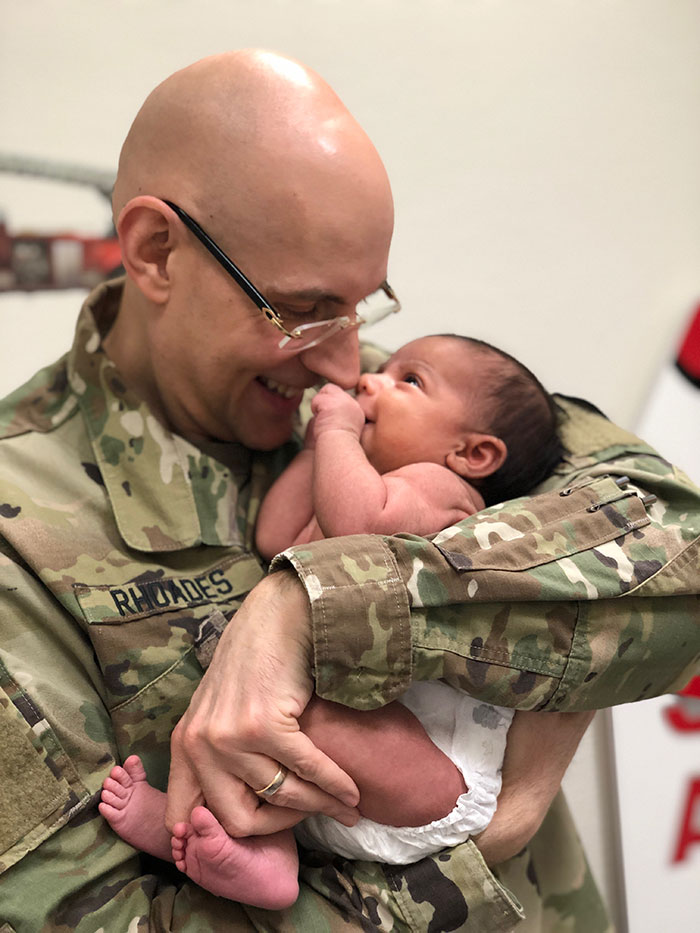Rhoades Turns Personal Challenge into Strength, Success
This article represents the latest in a series of personal interest stories designed to spotlight notable people, stories and achievements across the U.S. Army Medical Research and Development Command. If you would like to recommend a specific Soldier or civilian employee for this series, please contact Ramin A. Khalili, USAMRDC Public Affairs Office Writer, at ramin.a.khalili.ctr@health.mil
Maj. Daniel Rhoades has a phrase he likes to use in daily conversation — it's a rhetorical question, really — and it goes something like, "How far do you want to go?" It's not so much a question as it is a statement, of course — a way to challenge conventional notions of what is possible, what can be accomplished. From his hardscrabble upbringing in western Pennsylvania to now, sitting in his office at the U.S. Army Medical Research and Development Command's U.S. Army Medical Materiel Development Activity, it's a saying that has served Rhoades well his entire life.
"I love medicine," says Rhoades, a physician by trade who currently serves as the Medical Director of USAMMDA's Warfighter Expeditionary Medicine and Treatment Program Management Office. "I love the science behind it, and I love to help others."
You can sense his passion when he makes those statements — it's by design, to be sure — because such personal success isn't possible without that kind of decisiveness, that kind of focus. Rhoades dropped out of high school as a teenager to work in the factories near his hometown of Latrobe, Pennsylvania. It was only several years later, when he found himself impacted by a round of layoffs, that he decided on a rather stark change in direction.
"I always wanted to be a doctor, so I took the change out of my pocket and put it on the community college desk and told them I wanted to enroll in some classes," says Rhoades, who started his medical journey at 27 years old. "I had tried before and didn't do so well, but I decided I was going to do it on my terms this time."
For Rhoades, that meant — in his own words — "starting from scratch." He had to begin with the very basics of the profession: enrolling in classes teaching the foundations of algebra and chemistry ("I didn't even know the periodic table at that point," he says). All this was on top of working full-time to care for his young son and daughter, who were toddlers at the time. He eventually completed his formal studies at the University of Pittsburgh before attending medical school on an Army scholarship at the West Virginia School of Osteopathic Medicine. Then, during the tail end of a rotation during his intern year at the old Walter Reed Army Medical Center, Rhoades — who was considering either psychiatry or family practice as his final career field — shifted courses to follow his passion.
"It wasn't until I started working with the amputee population and the wounded warriors — I noticed such a positive atmosphere in the rehabilitation realm," he says. "I said this is it — this is what I want to do for the rest of my time."
It was an immediate calling for Rhoades, who graduated from the Physical Medicine and Rehabilitation Residency Program at the Walter Reed Army Medical Center in 2015 (along with his now-wife, Kimi) and was promptly deployed to Landstuhl Regional Medical Center in Germany. There, among a myriad of other duties — including serving as a Brigade Surgeon and as the Officer in Charge of the TBI clinic at LRMC — he established a Reconditioning Physical Readiness Training Program for injured Service Members; a unique training course combining both fitness and rehabilitation instruction for Soldiers dealing with a variety of injuries. For Rhoades, it was the sweet spot of professional duty and personal responsibility.
By chance, current USAMRDC Command Sergeant Major Victor Laragione was part of the team that helped get the RPRT program off the ground in Germany.
"We're extremely fortunate to have Maj. Rhoades on the USAMRDC team," says Laragione. "He is a true professional Soldier and physician; one who holds an undeniable passion for taking care of our Soldiers on and off the battlefield."
By 2019, it was off to USAMRDC where Rhoades — in typical "can-do" fashion — realized he could use his new positions at USAMMDA (where he also serves as the Product Manager for the Combat Wound Treatment and Management Program) as a force-multiplier on behalf of the Warfighter. Indeed, by working with the science and technology professionals to move products into the advanced development realm and then, if feasible, to the marketplace and into the hands of Soldiers, the combined output of both himself and his team becomes exponential.
"I recognized that in clinic, you're helping patients as you serve them individually," says Rhoades, "but when we step into acquisition, into the medical programs, we're bringing the products to the Warfighter on the battlefield [and] we're saving lives for the whole service population."
It's been a ride, that's for sure — one that Rhoades readily admits he didn't imagine was possible when he joined the Army in 2006. Perspective always shifts with the passage of time however, and so perhaps now — with a two-year-old daughter in tow — is a moment for such consideration. Maybe it's best to go back to that phrase he likes to use — the driving force behind what continues to be a stellar Army career.
Says Rhoades, "From the very beginning, even all the way back at community college, I kept telling myself, 'let's see how far I can make it.'"
 An official website of the United States government
An official website of the United States government
 ) or https:// means you've safely connected to the .mil website. Share sensitive information only on official, secure websites.
) or https:// means you've safely connected to the .mil website. Share sensitive information only on official, secure websites.





